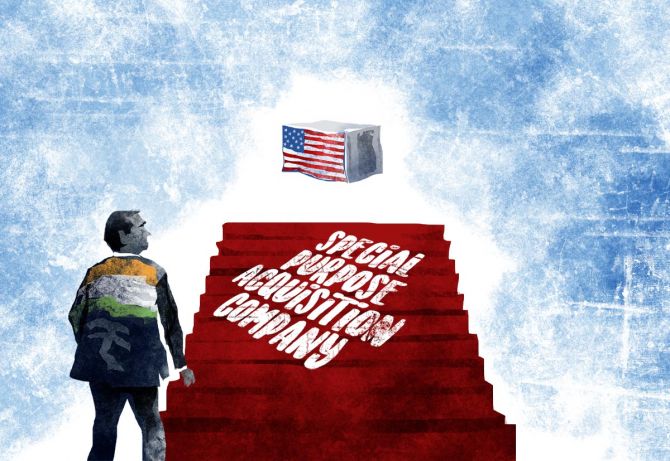Discussions have beginon possible deals in certain key sectors.
Surajeet Das Gupta reports.

Indian private equity (PE) funds looking for an exit from companies in which they have invested are experimenting with a new strategy -- sell or merge with a special purpose acquisition company (SPAC), also known as a blank check company.
The reason: It offers them a better valuation when they offload shares in one of their portfolio companies compared to selling it to strategic players or listing the company on the Indian bourses or offering it to another PE at a premium.
Discussion has started between blank check companies in the US and Indian PEs on possible deals in certain key sectors -- tech companies, health care and pharma, edtech, among others, which are the flavour of the season for US investors.
And the preferred suitors are vertical SPACs focused on one sector and looking for diversified assets within the same sector, reducing risks, and having a playbook across geographies.
Fund managers say currently they are mostly confined to valuations of companies below $1 billion. And start-ups set up by Indian promoters abroad, especially in the US, in which PEs have a stake, are the easiest to sell through an SPAC (for Indian incorporated companies, they have to be offshored or pay higher taxes).
Bala Deshpande, founding partner in PE firm MegaDelta Capital, which is looking at SPAC opportunities for a few of its investee companies, says: "An exit through SPACs makes sense for PEs because the latter are hungry for high-quality companies with good growth prospects. PE portfolios, therefore, fit their bill as they back growth companies and their portfolio has gone through due diligence, and they are well governed. SPACs work on the basis of aggregation arbitrage (they consolidate a few companies into an SPAC) and are more willing to pay up in terms of valuation."
Others agree. A top executive of a leading home-grown PE firm points out that the entity had discussion with SPACs on two models -- one, to sponsor an SPAC and then merge or sell one of its investee companies into it; and two, a straight exit.
"The first model for us had governance issues, though globally PEs have taken this route," said the executive, adding, "The second model is that it is relevant for companies with valuations between $500 million and ones not less than $1 billion (not unicorns), which want to go for an IPO but will find it difficult to get traction on Indian bourses. Also, it is easier through SPACs to sell the company and shareholding to a strategic investor later on. It's very difficult once you list in India."
He pointed out that SPACs, because of the regulatory restriction that they must find a target company in 12-24 months, are ready to offer higher valuations; otherwise they have to return the money they have raised.
These companies, after all, have raised huge amounts, but the number of growth companies with a sound business model to target is limited.
For instance, according to Refinitiv, which tracks the market, global SPAC IPOs have raised $100 billion till May 19 in calendar year 2021, which is 23 per cent more than what they did in 2020. But the pressure they face is reflected in the fact that the number of SPACs that went public was 116 in March but plummeted to just 18 in April.
The SPAC index of listed entities in the US has clearly underperformed the benchmark index, with many shares falling below listing price, leading to concerns about the efficacy of the instrument.
However, the Securities and Exchange Commission has put in new regulations to make listing more stringent.
Feature Presentation: Ashish Narsale/Rediff.com












 © 2025
© 2025